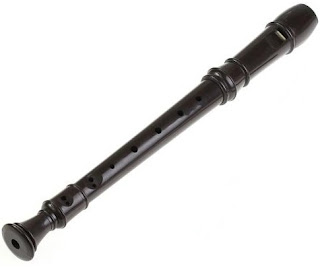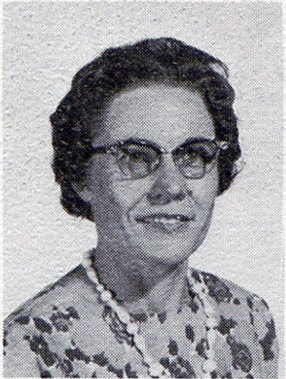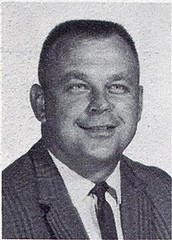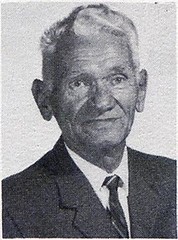Those of us kids who attended St. John Elementary School received a lot of musical education. At the very least, all of us learned to sing and learned the basics of musical notation. That was the minimal level that I myself reached. Many kids, however, further learned how to play one or more musical instruments quite well.
We began to sing in kindergarten. Every Christmas pageant included a performance by the kindergarten pupils singing "Away in a Manger" and "Jesus Loves Me" (as we older kids rolled our eyes and snickered).
As I wrote in an earlier post, I remember that when I was attending second grade in a one-room school in Middle Creek, we students in that school learned a group of songs -- I particularly remember The Star Spangled Banner and several Stephen Foster songs -- and then traveled into Seward on one occasion to participate in a day-long assembly where many students from several schools filled the St John gymnasium and all sang the same songs together. (I remember vaguely that in following years such singing festivals were conducted in Lincoln.)
In the third grade at St John, we all learned to play plastic ocarinas.


We did not learn musical notation yet. Rather, we learned only tablature, which is a series of drawings showing the ocarina holes that are supposed to be open or covered for each note.

Then in the the fourth grade we all learned how to play plastic recorders. In this year we learned tablature at first and then learned also simple music notation.


Fourth grade -- the recorder grade -- was taught by Lucinda Bartels, who is sitting in the front right of the above photograph.

Here is another photograph of her:

The musical instrument that Ms. Bartels loved much more than the stupid recorder was her autoharp.

When I was in the fourth grade, I spent much more time looking at and dealing with Ms. Bartel's autoharp than any of my classmates did.
This troublesome episode of my life began one Sunday when our fourth-grade class (perhaps along with the fifth-grade class) provided the choir music at the services in the downtown church. Each class had to sing as the choir about one Sunday every month. We assembled on the church balcony, next to the organ, and sang our little hearts out.
Steve Sylwester remembers:
In my experience, each class sang in church by itself through 4th grade. Then 5th and 6th grades were grouped in one choir, and 7th and 8th grades were grouped in one choir — singing in three-part harmony (1st voice, 2nd voice, 3rd voice).
Anyway, after that particular choir performance, there apparently were some complaints from the usually tolerant congregation that one choir member's bad singing had spoiled the entire choir's song and (some complainers thought furthermore) the entire church service.
On the following Monday, Miss Bartels pulled me aside and informed me that I would meet with her privately for about 15 minutes every day for the indefinite future to improve my singing. She tried to be kind, but she informed me essentially that my singing had three problems:
Every note I sang was approximately the same pitch.
The pitch was flat.
I sang loud.
And so, every day for the next several weeks I had to come to a small room next to the school secretary's office -- while all the rest of the kids were playing at recess -- and sing notes with Ms. Bartel's beloved autoharp. (As soon as the lesson began, the secretary would close the door between the secretary's room and the that small room.)
Ms. Bartel's would say, "here is a C" and would play a C on her autoharp -- bdddddddddddding. It sounded like a dozen different pitches to me. I would sing, laaaaaaaaaaaa, covering the entire range of pitches I heard.
"No!" she would say, "it's a C," and she would strum her autoharp again. And so we would continue for the entire 15 minutes. She preferred to strum her autoharp, but eventually she would relent and pluck only one string or would even blow the damned note on a recorder.
One day, my Dad, who managed the school's student teachers, came to the school and had to talk with Miss Bartels about some student teacher, so he asked the secretary where Miss Bartels was. The secretary answered, "Oh, she's in the next room tutoring some mono-tone." So, my Dad said, "Well, I will just poke my head through the door and ask her a quick question," and he looked in and saw to his surprise that the mono-tone was I, his own first-born son.
Miss Bartels eventually delegated this daily, dreary, demoralizing task to a student teacher, who persisted, with still-new student-teacher enthusiasm, in my tutoring. Eventually the tutoring succeeded enough that I became a rather normal, mediocre but non-abrasive singer. It was a happy day when Miss Bartels told me that I no longer had to attend these daily tutorings.
At St John there was such a No Child Left Behind policy with regard to singing, because singing was a fundamental part of our education. Singing and learning to read music was mandatory. Every day each class conducted two devotions in which we sang hymns. Each class comprised a choir that sang in church services once a month. The entire school comprised a huge choir that sang many songs for the annual Christmas pagent. Every student had to sing a lot.
When our class did our daily devotions, Candy Safarik usually played the piano. She did not even have to practice the songs beforehand. She could open the hymnal to any assigned hymn and play the hymn on sight.
A couple other students were able to play the piano well enough to lead hymns for devotions too, but not as easily. They normally needed to practice the hymns beforehand. I assume, however, that every class had a few kids who were able to play the piano well enough to play the daily devotion hymns.
At the end of fourth grade, we were told that we could sign up for band, which would begin in fifth grade. In about the last week of fourth grade, those who did decide to sign up for band appeared individually before Mr. Peter, who would teach the fifth-grade beginning band, and Mr. Marino, who would teach the band in the following years. Mr. Peter and Mr. Marino looked at us and talked with each of us and then recommended to each what instrument he should play. We kids had the impression that there was some scientific body-type criteria in these recommendations. For example, if you were kind of stout like John Garmatz, then you should play the tuba, and if you were kind of lanky like Jim Hardt and me, then you should play the trombone.
Then during the summer we ordered our instruments and brought them to the first day of fifth-grade class. Band was optional, and only about two-thirds of the fifth-grade class participated.
Mr. Marino showed up for the first practices in order to help Mr. Peter explain to each student the basic care and operation of the student's instrument, but then for the rest of the year Mr. Peter alone taught the band.

We had band practice for an hour before school classes began, about every other day. I have written in a previous post about how I did not practice much and instead merely copied Jim Hardt as he moved the trombone slide. However, playing in the band did help me improve my familiarity with music notation.
Our sixth-grade teacher Mr. Schmieding taught choir for all the upper-level classes -- sixth through eighth grades. Of all the teachers who taught us music, he was the strictest.
Mr. Schmieding had some fussy mannerisms when he taught choir. When he thought we were singing a note off-pitch, then he would play the correct pitch on a little, round harmonica that he always carried with him. He would blow the pitch, we would sing the note. Again he would blow the pitch, and again we would sing the note. He'd repeat this three or four or five times until we sang the note accurately. He also had some tuning forks that he would hit for some pitches.
Mr. Schmieding hated "harsh" singing. We would be singing a song, and he would stop us and say, "Not so harsh, children!" and would cringe slightly and push down with his hands, as if we were hurting his ears with our harsh singing. He objected to harsh singing especially whenever he prepared us to sing at an old people's home.
Mr. Schmieding continued with our instruction about music notation, and so even the students who did not participate in band continued to learn more and more about music notation all through elementary school.
Our school choirs did not sing only religious songs. One year, Mr. Schmieding taught us many of the songs from Mary Poppins and from My Fair Lady, and we then sang these songs at a concert. Because Mr. Schmieding made us practice those songs so much, I still remember them very well:
Chim Chim Cheree
Let's Go Fly a Kite
A Spoonfull of Sugar
Supercalifragilisticexpialidocious
Wouldn't It Be Loverly?
With a Little Bit O' Luck
I Could Have Danced All Night
On the Street Where You Live
In the upper grades, several of the band members practiced extra hard and excelled with their instruments. These students participated individually in talent competitions that where conducted at Concordia College. Those students who won those competitions competed further in other competitions in other towns, such as Lincoln.
For example, I remember that Jim Hardt, Gene Meyer and Steve Roettjer participated several years in the competitions at Concordia. When I visited their houses, I watched them practice for these competitions. I was sincerely impressed. Just looking at their sheet music amazed me. I used to spend a lot of time at Steve Roettjer's house (I will write about that in a future post), so I watched him practice frequently. He was a superb musician.
Of course, I was not inspired to practice to try to play at such a high level. I was content to watch them practice. I went to watch them play at the competitions.
When I attended Concordia High School, I chose not to participate in choir or band. Jim Hardt kept trying to persuade me to join choir, but I kept saying firmly "NO!"
Piano was a mandatory class at CHS, so I had to study piano during my two years there, but I remained a mediocre music student and never mastered the piano.
I never did learn to play an instrument well (none of the seven kids in my family did). The only instrument I ever really wanted to play was the banjo, because for a while I wanted to play in a folk-music group like the Kingston Trio. At the end of eighth grade, I bought a banjo through Mr. Roettjer, who ran the campus store, and I tried all summer to learn how to play it but then gave up. Later in my freshman year of college I tried for a while to learn to master the piano, but I gave up after about a month.
Because I did attend St John and Concordia High School, though, I did learn the fundamentals of music. When I sing in church, I read the notes and sing accordingly. I perceive that most of the people around me in church cannot read music at all, and so they do not sing much unless they already know the hymn's melody. Because I can sing confidently in church while many people cannot, I feel very grateful for the musical education that I received while growing up in Seward. If I had not been educated there, I never would have learned anything at all about music by myself.




No comments:
Post a Comment